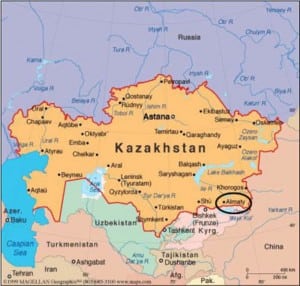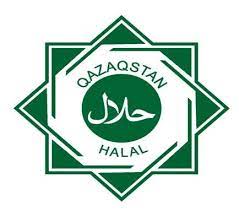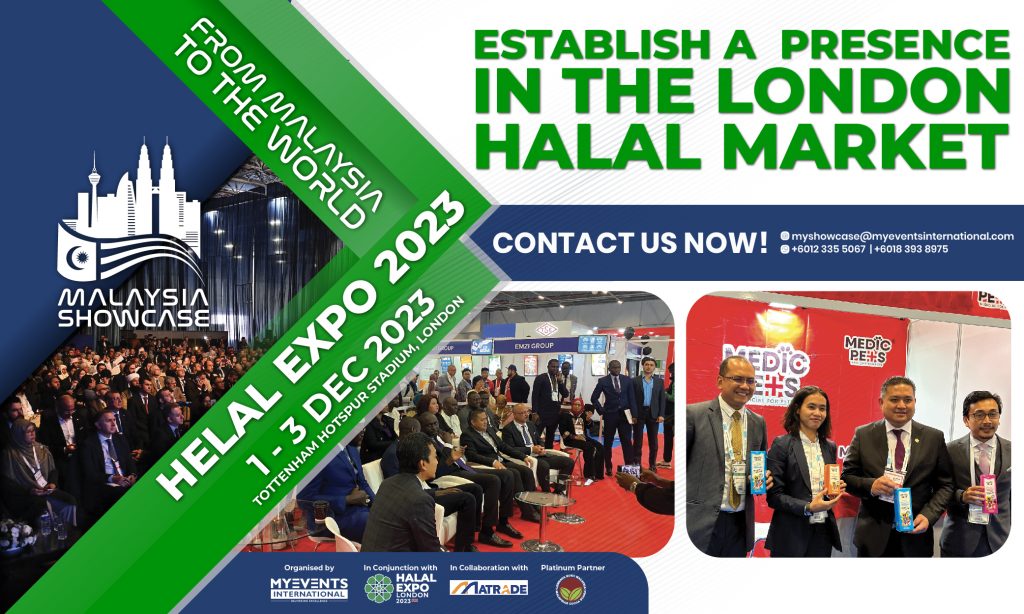By Almat Oryngaliul, Atashev Aibek Askarbekuly and Kazybek Zhuman
 NOVEMBER 19 — Boiled, roasted or fried meat – we serve them all in Kazakhstan. More importantly, for the country’s 70 per cent Muslim population, they must be prepared halal.
NOVEMBER 19 — Boiled, roasted or fried meat – we serve them all in Kazakhstan. More importantly, for the country’s 70 per cent Muslim population, they must be prepared halal.
Today, Kazakhstan’s halal industry is booming. Hundreds of new halal outlets have opened in recent years – a far cry from the early 2000s, when such places were scarce. Out of the US$22 billion (RM90 billion) spent on food and drinks each year, US$3 billion is dedicated to halal-labelled products.
This nascent growth over the last 15 years, attributed to an increasing number of Muslims and rising income levels, also brings promising economic diversification opportunities.
According to the “State of the Global Islamic Economy Report 2019/2020”, Muslims spent US$1.3 billion on halal food. As an exporting nation, Kazakhstan is strategically poised to provide for our neighbours and beyond in a massive market.
But for our halal industry to achieve long-term success, two things must happen. First, we will need to regulate the sector to ensure a quality ecosystem that can attract more investments. Second, we need to recognise the growth areas in the halal sector and work with other countries to tap on the opportunities in this expanding market.
Regulation and co-operation needed to move ahead
Up until 2014, independent certification institutions in Kazakhstan followed their own definition of halal when giving out halal food labels to companies.
This meant there was a lack of standardisation in the process of prepping food items and slaughtering animals in accordance with Shariah law.
In October 2014, national organisation The Spiritual Administration of Muslims of Kazakhstan (SAMK) established Halal Damu, a department for standardisation of halal products supported by the government and religious groups.
By setting up an organised system, we gain two benefits. The standardisation guidelines provide transparency that instill confidence in potential investors, while enhanced food quality and safety checks keep our citizens safe and healthy.
In a time when Kazakhs are increasingly interested in sustainability, a central body will be more informative about food sources, to allow them to make better choices.
Consumers will also recognise official halal stamps as an indication of excellent grade and clean production. The label helps to legitimise producers – a declaration of their high standards.
With the standardisation guideline in place, Kazakhstan is now moving towards a countrywide regulatory framework for the ten over certification bodies in its halal industry.
The country has been studying Malaysia’s experience to strengthen and grow its halal market. Malaysia, where 60 per cent of its 32 million population are Muslims, is widely regarded as having one of the highest standards in the world when it comes to halal certification guidelines.
In 2017, we invited Malaysian experts to assess our halal industry and provide recommendations for further improvements. A year later, we were accredited by the Department of Islamic Development Malaysia, which allowed us to freely export our products to 49 countries worldwide under the label “SAMK halal.”
Kazakhstan now has more than 400 SAMK-certified enterprises, and a clear process in place to ensure high standards. Products have to go through lab tests before their manufacturers are issued a halal certificate.
Businesses in the halal sector are also required to undergo monthly audits. Organisations that are found to have flouted rules have to rectify their mistakes within a certain timeframe. They risk revocation of their certificates if the lapses are not resolved.
The development of a thriving halal ecosystem is a first step that paves the way for more partnerships between Kazakhstan and Malaysia. The halal tourism segment is another area ripe for development.
Before the global Covid-19 outbreak, Kazakhstan’s flag carrier, Air Astana, ran visa-free direct flights between Kuala Lumpur and Almaty thrice a week.
Both countries were then also in talks to introduce more direct flights, and for Malaysia to provide training to help Kazakhstan develop its halal hospitality industry.
The coronavirus pandemic has forced these talks to take a backseat for now, as much of global travel remains at a standstill. But the Covid-19 situation has shown us that the halal industry, though full of potential, will need to be backed by strong financial support too, to weather potential crises.
Bridging halal industry and Islamic finance
Given Kazakhstan’s proximity to other Muslim-majority nations, growth in the halal industry will contribute positively to its trade. And Islamic finance could provide a fillip to the supply chain.
During the global financial crisis, Islamic banks showed greater resilience and stability compared to their conventional counterparts due to their compliance with Shariah principles, such as prohibiting speculation and banning risky ventures.
In fact, the Astana International Finance Centre (AIFC) in Kazakhstan, which aims to enhance local and regional financial service growth and development, pays special attention to Islamic finance.
This dovetails well with the halal industry, as there is a potential market of over 80 million people in Eurasia – a number projected to reach 100 million by 2030.
The high projected growth bodes well for a stronger Kazakh halal industry as we will be able to attract more investments from abroad. For instance, the sector can increase trade between Kazakhstan and Malaysia, which quadrupled to US$478 million in 2018 from a year before.
To promote the AIFC as a regional hub, we have set up the AIFC Advisory Council on Islamic Finance, where international experts will chart the country’s development of Islamic finance.
With asset-backed financing and risk-sharing, Islamic finance can support small and medium–sized enterprises. And in a post-Covid-19 world, this stability and sustainable economic growth is even more crucial.
* Almat Oryngaliul is the Head of Methodology and Rationing Department at Kazakhstan’s National Center for Accreditation.
Atashev Aibek Askarbekuly is the Director of Halal Damu at The Spiritual Administration of Muslims of Kazakhstan.
Kazybek Zhuman is a Senior Manager of Islamic Finance & Business Hub at the Astana International Financial Centre.



